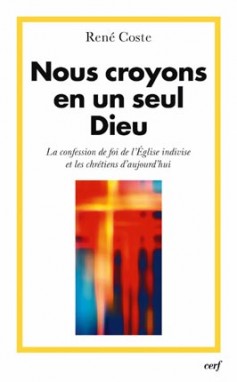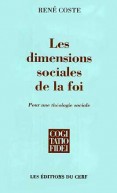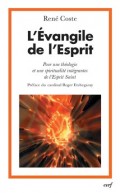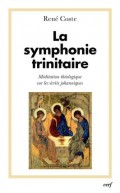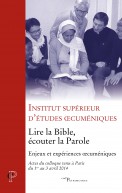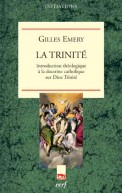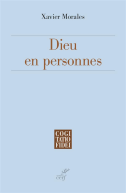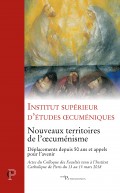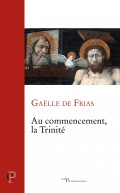Nous croyons en un seul Dieu
de René Coste
Collection Théologies
240 pages - nov. 2007
33,00€
La foi au Dieu trinitaire, Père, Fils et Saint-Esprit, et à l'incarnation de la seconde personne est le cœur de la Révélation accomplie en Jésus-Christ. L'Église des Pères l'a solennellement accueillie, explicitée et proclamée dans le Symbole de Nicée-Constantinople, élaboré par les conciles œcuméniques de Nicée (325) et de Constantinople (381). Le vénérable Symbole des Apôtres (plus bref) exprime la même foi avec la même netteté. Le Symbole de Nicée-Constantinople est le symbole universel de la foi chrétienne qu'au XXe siècle le mouvement œcuménique a reconnu comme un « outil théologique et méthodologique » capital pour la promotion de l'unité des chrétiens. Cette confession de foi de l'Église indivise de jadis doit être reçue et promue prophétiquement comme celle de l'Église indivise de l'avenir, pour laquelle l'ensemble des chrétiens doit œuvrer sous la guidance de l'Esprit Saint. La dynamique œcuménique est ainsi une dimension essentielle de la démarche théologique et spirituelle proposée par ce livre. Peut-il en être autrement pour cette nouvelle étape du temps de l'Église qu'est l'âge planétaire dans lequel nous sommes entrés. Il s'agit, dans ce temps de grâce, de penser d'une façon toujours renouvelée, d'intensifier et d'affirmer hardiment, dans l'écoute et le dialogue, notre foi au Dieu trinitaire. Car le Dieu de Jésus-Christ – le Dieu vivant – est le Dieu trinitaire. La foi en lui doit imprégner et dynamiser toute notre existence personnelle comme la vie entière de l'Église. Ce sont les fondamentaux qui comptent pour construire une foi adulte. L'ampleur du « Credo » – sous l'une ou l'autre forme qu'on lui connaît – est illimitée. Nous pouvons le comprendre et le vivre mieux que jamais dans le passé. Pour ces raisons, le livre plaide chaleureusement pour qu'il soit véritablement vécu comme un grand moment de la liturgie dominicale et pas seulement comme une sorte d'intermède intellectuel dans la célébration. La proclamation du « Credo » est bien comme un buisson ardent qui nous révèle l'infinie beauté du Dieu trinitaire.
--
Faith in the Trinitarian God - Father, Son and Holy Spirit - and in the incarnation of the second person, lies at the heart of the Revelation accomplished in Jesus Christ. The Church of the Fathers has received it with solemnity, explained and proclaimed it in the Niceno-Constantinopolitan Creed, elaborated by the ecumenical councils of Iznik (325) and Constantinople (381). The venerable Apostles’ Creed (shorter) expresses the same faith with the same clarity. The Niceno-Constantinopolitan Creed is the universal creed of Christian faith acknowledged in the 20th century by the ecumenical movement to be a vital ‘theological and methodological tool’ for the promotion of Christian unity. Thus the confession of faith of the undivided Church of the past must be received and promoted prophetically as that of the undivided Church of the future, for which Christians must work together under the guidance of the Holy Spirit. In this way, ecumenical dynamics is an essential dimension of the theological and spiritual approach advanced by this book. How could it be otherwise, in this new period for the Church, this new global age we have entered? In these years of grace, we must rethink, intensify and boldly proclaim, as we listen and as we speak, our faith in the Trinitarian God. For the God of Jesus-Christ – the living God – is the Trinitarian God. Faith in him must penetrate and activate our personal lives and the life of the Church. That is the cornerstone on which an adult faith can be constructed. The scope of the ‘Creed’ – in whatever form we know it – is unlimited. We can understand and live it better today than ever before. For these reasons, the book warmly recommends that the Creed be experienced as a high point of dominical liturgy, and not simply an intellectual interlude in the celebration. The proclamation of the ‘Creed’ is like a burning bush that lights up the infinite beauty of the Trinitarian God.
--
Faith in the Trinitarian God - Father, Son and Holy Spirit - and in the incarnation of the second person, lies at the heart of the Revelation accomplished in Jesus Christ. The Church of the Fathers has received it with solemnity, explained and proclaimed it in the Niceno-Constantinopolitan Creed, elaborated by the ecumenical councils of Iznik (325) and Constantinople (381). The venerable Apostles’ Creed (shorter) expresses the same faith with the same clarity. The Niceno-Constantinopolitan Creed is the universal creed of Christian faith acknowledged in the 20th century by the ecumenical movement to be a vital ‘theological and methodological tool’ for the promotion of Christian unity. Thus the confession of faith of the undivided Church of the past must be received and promoted prophetically as that of the undivided Church of the future, for which Christians must work together under the guidance of the Holy Spirit. In this way, ecumenical dynamics is an essential dimension of the theological and spiritual approach advanced by this book. How could it be otherwise, in this new period for the Church, this new global age we have entered? In these years of grace, we must rethink, intensify and boldly proclaim, as we listen and as we speak, our faith in the Trinitarian God. For the God of Jesus-Christ – the living God – is the Trinitarian God. Faith in him must penetrate and activate our personal lives and the life of the Church. That is the cornerstone on which an adult faith can be constructed. The scope of the ‘Creed’ – in whatever form we know it – is unlimited. We can understand and live it better today than ever before. For these reasons, the book warmly recommends that the Creed be experienced as a high point of dominical liturgy, and not simply an intellectual interlude in the celebration. The proclamation of the ‘Creed’ is like a burning bush that lights up the infinite beauty of the Trinitarian God.
- Dimensions : 145x235x15
- ISBN : 9782204084505
- Poids : 370 grammes

